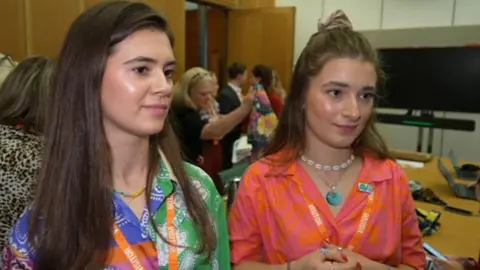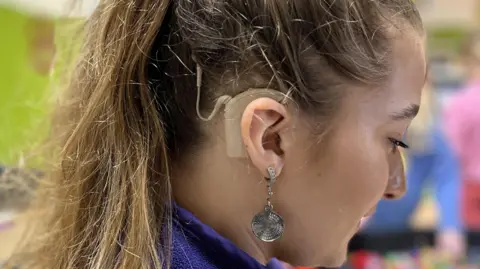Sisters take language therapy fight to MPs
 BBC
BBCTwo sisters born profoundly deaf have called on the government to provide specialised language therapy scheme on the NHS.
Sade Oram, 25, and her sister Topaz, 23, from Wiltshire, were fitted with cochlear implants as toddlers and auditory verbal therapy helped them make sense of sound.
But currently just 10% of deaf children nationally can access the treatment, according to charity Auditory Verbal UK.
The Department of Health and Social Care said the NHS wants “all children with hearing loss to have the opportunity to unlock their potential”.
The siblings, from Warminster, travelled to Westminster to urge MPs to support the #HearUsNow campaign
Sade went to fortnightly sessions as a toddler and within a year said she had as much speech as any other child in her age group.
“I went to a mainstream primary school and since then I’ve had no extra support. I’ve been set up for life and live my life as if I didn’t have a hearing impairment,” she said.
“But we know the majority of deaf children do not have these opportunities – and this is not fair.”
Cochlear implants work by turning sound into electrical signals and sending them to part of the inner ear called the cochlea. From here, the signals travel to the brain.

Auditory verbal therapy uses play to help deaf children make sense of those noises, and once the brain can listen effectively, they will usually be able to learn to speak.
Sade added the support had been invaluable to their parents who feared “we would be in our own little bubble”.
Around 80% of deaf children who receive the treatment for at least two years achieve spoken language on a par with their hearing peers, Auditory Verbal UK said.
Topaz added: “I think it’s great that cochlear implants are available on the NHS but there’s no point them being on the NHS if [recipients] are not given support through auditory verbal therapy.
Anita Grover, chief executive of Auditory Verbal UK, said: “Deaf children are not currently achieving the outcomes that we know are possible.”
“We are asking MPs to support our Hear Us Now campaign and help create a sound future for deaf children.”
Research by the charity found that an investment of £2m a year for the next 10 years all deaf children in the UK could access the therapy.
A spokesperson for the DHSC said: "The NHS is broken and paediatric audiology has been neglected, with a lack of clinical specialists and a shortage of trainees in the field. Children are suffering as a result.
“NHS England are committed to improving audiology services to ensure that all children with hearing loss have the opportunity to unlock their potential.”
Follow BBC Wiltshire on Facebook, X and Instagram. Send your story ideas to us on email or via WhatsApp on 0800 313 4630.
